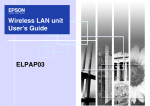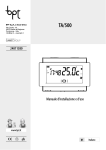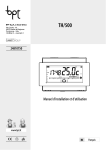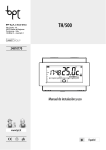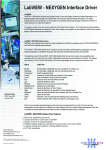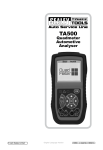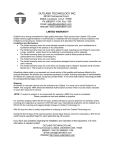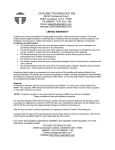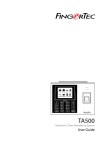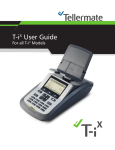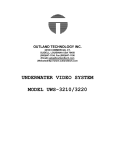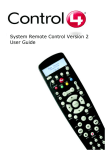Download TA/500
Transcript
TA/500 24811390 Installer and user manual www.bpt.it EN English General Notes •Read the instructions carefully before beginning the installation and carry out the actions as specified by the manufacturer. •The installation, programming, commissioning and maintenance of the product must only be carried out by qualified technicians, properly trained in compliance with the regulations in force, including health and safety measures and the disposal of packaging. •The installer must ensure that the information for the user, where there is any, is provided and delivered. •Before carrying out any cleaning or maintenance operation, disconnect the devices from the power supply. •The equipment must only be used for the purpose for which it was expressly designed. •The manufacturer declines all liability for any damage as a result of improper, incorrect or unreasonable use. •Warning: danger of explosion if the batteries are replaced with others of the wrong type. •Once batteries are dead they must not be thrown away with unsorted waste but collected separately and sent for suitable recycling. TA/500EN 24811390 31-10-14 DISPOSAL - Make sure the packaging material is not disposed of in the environment, but rather disposed of in compliance with the laws in effect in the country in which the product is being used. At the end of the product’s life cycle, make sure it is not disposed of in the environment. The equipment must be disposed of in compliance with current laws and its components recycled where possible. The components that should be recycled are marked with the material’s ID marker. EC Declaration - BPT S.p.A. a Socio Unico declares that this device complies with directives 2004/108/EC and 2006/95/EC. Originals upon request. 2 Description of device ④ ⑨ ⑤ ⑥ ⑦ ⑧ ① ② ③ ⑬ ⑰ ⑭ ⑪ ⑱ ⑯ ⑫ ⑩ Button to change thermal zone mode ⑪ Button to access device set-up ③ Battery charge status (only on battery-powered version) Window contact active (only on battery-powered version) The arrow indicates the active user profile ⑫ Navigation buttons ④ ECO program in operation ⑬ System in heating mode ⑤ NIGHT program in operation ⑭ Boiler in operation ⑥ Thermal zone excluded from control ⑮ System in cooling mode ⑦ Screen lock on ⑯ Cooler in operation ⑧ Remote activation in progress (only on battery-powered version) ⑰ System off ⑨ Manual programming in operation ⑱ System in frost-protection mode ① ② TA/500EN 24811390 31-10-14 ⑩ ⑮ 3 Installation Install the unit in a position which is suitable for correct room temperature measurement, for example on an internal wall. Avoid installation in alcoves, behind doors or curtains, or near heat sources. A Wall-mounted installation B ① •Open the device by pressing the button on the bottom B, with your finger ① for the battery-powered model or with a small screwdriver ② for the model powered by mains electricity. C •R emove the terminal block cover and fasten the back of the unit either to the wall or inside the recessed back-box C using the screws and expansion plugs supplied. •After making the electrical connections shown below, replace the terminal block cover. WARNING. install the device on flat surfaces and do not over-tighten the screws. 4 TA/500EN 24811390 31-10-14 ② D N L VALVE OPEN M CLOSED U2 E N L LOAD The connections are made according to the type of equipment controlled by the programmable thermostat. Figures D and E refer to the mains-powered programmable thermostat but are also valid for the battery-powered version, only for the part relating to the relay contacts. Figure F illustrates possible uses of the terminals present only on the battery-powered model. ① Connection through remote activation (maximum distance 20 metres), ② Connection through magnetic contact (maximum distance 20 metres), ③ Connection by remote probe (OH/STI, OH/STE, maximum distance 10 metres), KEY Mains power supply wires N = neutral – L = live U1 Relay contacts NC = normally closed contact C = common NO = normally open contact F Loads U1 = burner, circulation pump, solenoid valve, etc. U2 = motorised valve ① ② TA/500EN 24811390 31-10-14 Electrical connections Inputs for remote control (only on battery-powered model) ③ NOTE. Before connecting, refer to the technical documentation of the device to be controlled. 5 G NOTE. In the mains-powered device, in the event of there being no power supplied, the relay remains in the state prior to the power outage. Inserting/replacing batteries (only on battery-powered model) H Insert 2 AA 1.5V LR6 penlight alkaline batteries (not supplied with purchase) into the relative slot, respecting the polarities shown on the bottom of the housing G. WARNING. Inserting the batteries the wrong way round could damage the unit. Close the unit H making sure that the hooks are inserted into the slots. I Device reset NOTE. This operation does NOT lead to any programming being deleted. 6 TA/500EN 24811390 31-10-14 If necessary lightly press the button inside the opening shown in figure I; release the button as soon as the screen darkens and wait a few seconds before starting normal use of the device again. Operation of device When first turned on, A the programmable thermostat is in heating mode is on; the right-hand side of the display shows the temperature measured. and the Comfort program NOTE. When the device is in stand-by, the first touch on the screen switches on the back-lighting and does not carry out any command. Setting date and time Touch the clock area A and keep touching it until the minutes start to flash B. A B Use the arrows to set the desired value and the button to move on to adjusting the time. Press the button to see and set the following, using the arrows: - Minutes - Hour - Year - Month - Day - Format of time displayed (12 or 24 hr) - Enable/disable automatic change to and from daylight savings time C. buttons Prolonged pressing of the takes you to the desired value more quickly. TA/500EN 24811390 31-10-14 C Note. If no button is pressed for a few seconds, the device goes back to the main screen and the values inserted are considered valid. 7 Changing the system's operating mode A Touch the area shown in figure A and continue touching until a beep indicates the mode is changed between: System in Heating mode System in Cooling mode System off System in Frost-protection mode When the system is off ( ), the image in figure B is displayed on the screen for a few seconds, to indicate that the system is off; Then the temperature detected will reappear. B C When the system is put into frost-protection mode C ( ) the arrows let you set the minimum ambient temperature tolerated; Then the temperature detected will reappear. Note. Programmable frost-protection temperature: Minimum 3.0°C – Maximum 16.0°C. Choosing a heat management program In Cooling mode Comfort 24.0 °C 26.0 °C Eco 28.0 °C Night E 8 TA/500EN 24811390 31-10-14 D By pressing the button in figure D it is possible to choose 3 levels of desired temperature. The three pre-set temperature levels are: In Heating Mode Comfort 20.0 °C 18.0 °C Eco 16.0 °C Night Each time it is pressed, it shows the program in activation and the pre-set desired temperature for a few seconds EF; then the current time and temperature detected reappear. F G Exclusion from thermal control D To activate this mode press button until the icon appears D. If the system is in "Heating" mode, the frost-protection function remains on. The frost-protection temperature set G is shown for a few seconds, then the current time and temperature detected are displayed H. If the system is in "Cooling" mode, the control will be totally excluded. H Manually forcing the desired temperature With any heating management program active I (Eco, Comfort, Night), press the arrows J to change the desired temperature set. TA/500EN 24811390 31-10-14 I The new desired temperature is shown in place of the temperature detected J, any active program icon disappears to leave space for the icon. J After the video time-out the current time and temperature detected reappear. 9 Other information that can be displayed on the main page A B By briefly pressing on the area where the temperature detected is displayed A, the objective temperature (set point) is displayed in place of the time B. Press the highlighted area again A to go back to the previous display mode. Displaying the temperature detected by an external probe If an external probe, set as secondary, is connected to the device, by briefly pressing on the area where the temperature detected is displayed A, the temperature detected by the external probe is displayed in place of the time C. Press again on the area where the temperature detected by the main probe is displayed to return to the previous display mode. C Changing the pre-set temperature levels With any heat management program active (Eco, Comfort, Night), press and hold down the area highlighted in figure D until the screen in figure E appears. Press on the arrows E to change the desired temperature for the program displayed. Press and hold down the area highlighted in figure E to display the next program to be changed F. E 10 TA/500EN 24811390 31-10-14 D Proceed as explained before to make changes to the programming and do the same for all the pre-set programs Note. The changes are effective for programming relating to the active User. F Unlocking the screen If screen lock is enabled G, pressing on any sensitive area of the screen gives access to the window shown in figure H. G TA/500EN 24811390 31-10-14 H The first number flashes; use the arrows to choose the first digit of the code, and the arrow to move on to the next digit; once all the digits of the code have been entered, press the button to confirm what has been entered and the screen unlocks; the unlocking is valid until the next time the screen times out. 11 Configuration of general parameters of the device When the device is in "Exclusion from thermal control" mode (see page 9), holding down the button A gives access to the device's configuration screens B. Note. After accessing the configuration screens, pressing the button lets you display the parameters to be configured in sequence, the button lets you exit the configuration window and go back to the screen in figure A. Changing User profile The device can manage the thermal preferences of two User profiles. For each user profile different "Comfort", "Eco" and "Night" programs can be created for the Heating and Cooling modes. A Use the arrows to change the active User profile B. Press the button to move on to the next parameter to be configured. B Enabling the screen lock The factory settings do not provide any protection from changes for the device C. To leave this setting unchanged and move on to the next parameter, press the button. If you want to protect the device from unwanted changes to programming, use the arrows to enable the screen lock D. D 12 Press the button to access the window that lets you set the code (password) that must be entered to unlock the device. TA/500EN 24811390 31-10-14 C E The first number flashes E; use the arrows to enter the first digit of the code, and the arrow to move on to the next digit; pressing button at any time means the code entered is considered valid and you move on to the next parameter to be configured. Changing the calibration of the temperature detection probe If the location of the device does not permit suitable detection of the temperature, it is possible to change the temperature detected by ±3 °C with increases of a tenth of a degree. Use the arrows F to change the data detected by the desired value and press the button to move on to the next parameter to be configured. F TA/500EN 24811390 31-10-14 Setting the type of heat management algorithm G The device lets you choose the type of algorithm to apply for the management of the system between: •Differential •Proportional Integral H Differential Algorithm G If, on screen G, using the arrows, the differential algorithm type has been chosen, press the button to customise the value of the differential, using the arrow H. Note. The range of adjustment goes from 0 to 1°C. 13 Temperature OFF This function is useful for environments that are particularly hard to air condition, with extreme variations in external temperature and commands the switching on of the system as shown in figure I. Set-point + differential Set-point ON ON Time Set-point – differential I Proportional Integral Algorithm If, on screen G, using the arrows, the proportional integral algorithm type has been chosen, the screen in figure J is displayed. 1h J Press the button to be able to access the screen in figure K which, using the arrows, lets you choose one of the 4 available programs (see table). The first 3 (P1 - P2 - P3) cannot be changed. K Program P4 can be made up as required. Press the button in figure K to be able to enter the duration of a cycle, using the arrows L. Press the button in figure L to be able to enter the minimum on time, using the arrows M. M 14 TA/500EN 24811390 31-10-14 L ONPress the button in figure M to be able to enter the value of the proportional band, using the arrows N. ON Press the button to move on to the next parameter to be configured. N Temperature 1h Set-point Time Prog. Cycle duration Minimum ON time Proportional (minutes) (minutes) Range P1 10 1 P2 P3 P4 5 1 20 2 from 5 to 40 from 1 to 5 1.5 °C 1.5 °C 1.5 °C from 1 °C to 3 °C Type of system Base for gas burner, convector heaters, zone valves, aluminium radiators Electric radiators Radiant or underfloor systems, cooling Setting the unit of measurement for the temperature Choose the unit of measurement for the temperature using the arrows O. Press the button to move on to the next parameter to be configured. TA/500EN 24811390 31-10-14 O 15 Use of terminals (only on battery-powered model) Choose the function associated with the terminals using the arrows A from: = compatible remote probe A = telephone contact = window contact Choice of main probe (only on battery-powered model) If you have chosen to connect to the terminals an external probe ( ), pressing the button will make the screen in figure B appear. B Using the arrows you can choose the function that the external probe must carry out: = Secondary probe = Main probe Note. If the external probe is set as the main probe, the temperature it detects is shown on the display and used as a reference for the operation of the heating/cooling system. The temperature detected by the device's internal probe cannot be seen on the display. Remote activation via phone (only on battery-powered model) If you have chosen to connect to the terminals a suitable telephone interface C ( ), pressing the button brings up the screen in figure D. C 16 TA/500EN 24811390 31-10-14 By connecting a suitable telephone interface to the terminals you can activate the "Comfort" program for the Heating or Cooling modes, in the following ways: Activation - Close the contact for at least 5 seconds. The icon comes on on the display. Deactivation - Close the contact for at least 5 seconds. The icon disappears from the display and the device goes back to the operating mode prior to activation. Deactivation can also be achieved by manually changing the operating program. Using the arrows you can set the operating mode that the device must take up on receipt of the remove phone command. = Heating = Cooling D Press the button to move on to the next parameter to be configured. Window contact (only on battery-powered model) E If you have chosen to connect to the terminals a window contact E ( ), you can set it so that the thermal zone is turned off thirty seconds after the window in which the contact is fitted is opened. Note. When the window is closed again, the thermal zone goes back to the mode prior to its activation. Press the button to move on to the next parameter to be configured. Back-lighting of display (only on mains-powered model) F Using the arrows F, choose whether the back-lighting should always be on (ON) or only when the display is touched. Press the button to move on to the next parameter to be configured. TA/500EN 24811390 31-10-14 Adjusting display brightness Change the screen brightness using the arrows G. OO= Back-lighting always off. G Press the button to move on to the next parameter to be configured. 17 Buttons beep Choose whether to activate/deactivate the buttons beep using the arrows A. Press the button to move on to the next parameter to be configured. A Hours of activity counter The screen in figure B shows the device's hours of activity. To reset the counter to zero, press it for a long time in the area highlighted in the figure. Press the button to move on to the next parameter to be configured. B Firmware version The screen in figure C shows the number of the firmware version installed on the device. Press the button to move on to the next parameter to be configured. Replacing batteries (only on battery-powered model) D The flashing icon on the display D indicates that the batteries must be replaced within about 1 month. Note: To save the remaining energy, the display's back-lighting is deactivated. The icons and indicate that the battery charge is not enough to manage the thermal zone, which is therefore excluded from control E. WARNING. Failure to replace the batteries in time may cause damage to the heating system (anti-freeze protection is no longer guaranteed). E 18 TA/500EN 24811390 31-10-14 C Note. In all models of the device, the temporary lack of power caused by a mains power outage or replacing the battery, does NOT lead to any programming being deleted. TA/500EN 24811390 31-10-14 Technical features Battery-powered TA500 Mains-powered TA500 •Power supply: 2 alkaline LR6 penlight AA 1.5V batteries (not supplied). •Battery life: More than 1 year. •Time available for replacement of batteries: 1 minute •Relay: max. voltage 250 V, max. current 5A with resistive load (2A with inductive load). •Type of action: 1B-U. •Available contacts: 1 NA-NC switch contact. Available inputs: 1 input for remote control or for connection of external probe (maximum cable length 10 metres). •Temperature range of external probe: from –30 °C to +60°C. •Accuracy of internal probe: ≤ ±0.3°C. •Resolution temperature reading: 0.1°C. •Accuracy of clock: maximum error ±1 sec/day. •Range of adjustment: from +3°C to +35°C. •Protection rating: IP30. •Operating temperature: from 0 °C to +40 °C. •Maximum operating relative humidity: 93% (without condensation). •Dimensions: 140x92x24.5 mm •Room temperature measurement interval: 15 seconds. •Electrical insulation: Class II, reinforced between accessible parts and terminals, •Maximum control unit temperature: T40 •Power supply: 230 Vac 50/60Hz •Consumption: 16mA. •Autonomous life without power supply: about 10 hrs. •Relay: max. voltage 250 V, max. current 5A with resistive load (2A with inductive load). •Type of action: 1B-U. •Available contacts: 1 NA-NC switch contact. •Accuracy of internal probe: ≤ ±0.5 °C. •Resolution temperature reading: 0.1°C. •Accuracy of clock: maximum error ±1 sec/day. •Range of adjustment: from +3°C to +35°C. •Protection rating: IP30. •Operating temperature: from 0 °C to +40 °C. •Maximum operating relative humidity: 93% (without condensation). •Dimensions: 140x92x24.5 mm •Room temperature measurement interval: 15 seconds. •Electrical insulation: Class II, reinforced between accessible parts and terminals, •Maximum control unit temperature: T40 19 20 TA/500EN 24811390 31-10-14




















